Click the images to view the presentation slides. Please note: links will open in a new browser window or tab.
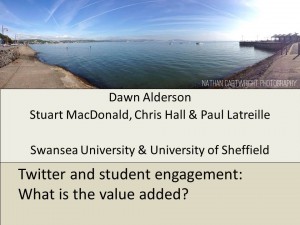 Twitter and student engagement: What is the value added?
Twitter and student engagement: What is the value added?
Dawn Alderson – Swansea University
This session refers to qualitative research about third year undergraduates’ use of Twitter during lectures; with a focus on student engagement, specifically the cognitive dimension (HEA).
Reference will be made to the methodology adopted for small-data analysis in order to consider findings that show the value-added of Twitter’s feedback loop for student reflective activity.
Detailed description of short paper
Social media use in teaching: Results from a questionnaire on use in higher education
Caroline Haythornthwaite @hthwaite – University of British Columbia
This paper reports on results of a questionnaire completed by 333 respondents on the use of social media in teaching that explored how extensively SM were being used in teaching, educators’ intentions in integrating these tools into their teaching, and their successes and/or difficulties in using the tools.
Detailed description of short paper
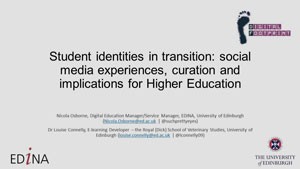 Student identities in transition: social media experiences, curation, and implications for higher education
Student identities in transition: social media experiences, curation, and implications for higher education
Nicola Osborne @suchprettyeyes and Louise Connolly @lconnelly09 – University of Edinburgh
Students increasingly arrive at university with a range of existing social media presences.
In this paper we will explore how students conceptualise and manage their online presence, and how this aligns with professional social media best practices. We will then discuss implications for teaching and learning in practice in HE organisations.
Detailed description of short paper
Audio recording of presentation
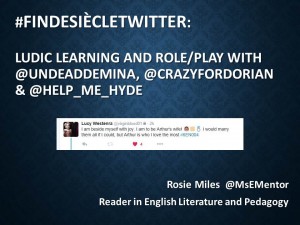 #FinDeSiècleTwitter: Ludic learning and role/play with @UndeadDeMina, @CrazyForDorian and @Help_Me_Hyde
#FinDeSiècleTwitter: Ludic learning and role/play with @UndeadDeMina, @CrazyForDorian and @Help_Me_Hyde
Rosie Miles @MsEmentor – University of Wolverhampton
This paper presents an innovative use of role-play using twitter as an example of what Kolb and Kolb term “ludic learning” (2010). The potentially changed and challenged tutor’s role, students teaching each other, issues of privacy and the encouragement of the carnivalesque are all discussed.
Detailed description of short paper
Audio recording of session
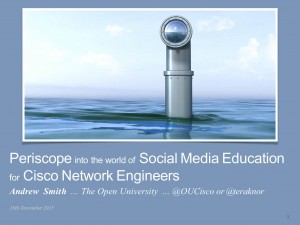 Periscope into the world of social media education for Cisco network engineers
Periscope into the world of social media education for Cisco network engineers
Andrew Smith @OUCisco – The Open University
Over the summer of 2015, the Open University Cisco Networking Academy conducted experimental teaching sessions with social media live streaming (via Periscope). Focussing on microteaching a practical skill in approximately ten minutes, these sessions have been recommenced from Oct 2015 as a weekly event. This short paper will share the outcomes of this approach.
Detailed description of short paper
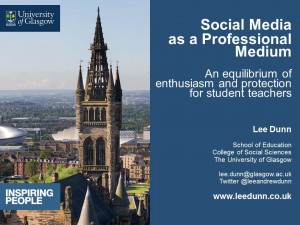 Social media as a professional medium: Achieving an equilibrium of enthusiasm and protection for new teachers
Social media as a professional medium: Achieving an equilibrium of enthusiasm and protection for new teachers
Lee Dunn @leeandrewdunn – University of Glasgow
This paper explores the use of social media within a blended mode of study. Specifically, it aims to consider the professional use of online social contexts to support teaching and encourage collaboration between learners. It will illustrate some factors intended to protect their digital identities, confidence and online well-being.
Detailed description of short paper
Audio recording of session
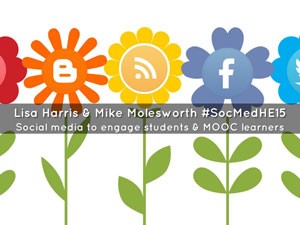
Building networks of campus-based students and MOOC learners
Lisa Harris @lisaharris and Mike Molesworth – University of Southampton
We will report on our experience with integrating an introductory campus-based module for MSc students with our MOOC in real time. The objective was to encourage our students to develop their online networks for learning and professional purposes, by sharing experiences and building relationships with a global community of MOOC learners.
Detailed description of short paper
Audio recording of presentation
The role of technology as mediating tools in developing professional identity and competency of trainee accountants
Iwi Ugiagbe-Green – Leeds Beckett University
The aim of the paper is to present findings from an empirical study which explores the mediating roles of technology during the initial professional development of trainee accountants. During this process, the trainee accountant has to demonstrate development of their professional identity and competency for assessment purposes.
Detailed description of short paper
Audio recording of presentation